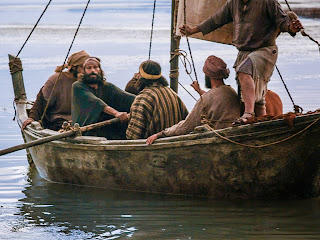Let me tell you a story about a strange thing that it seemed God did. It seemed to me that he was enjoying himself, but in the midst of it, it kinda scared the piss out of me.
A few friends and I were out deer hunting. Now, I have spent most of my life in the woods, hiking, cutting firewood, praying, so I’m real comfortable in the woods, but this was my first hunting trip. It was an annual event with my buddies.
We camped in the driveway of some friends who lived in deer country. They had moved to these mountains a couple of years ago, and had been living in a shack built onto the little motor home they’d arrived in; the toilet still froze solid at night. They needed a better home.
They had applied for a government program that would give them a used double-wide mobile home, but the relevant agency had just canceled the program before these guys were taken care of. We went to prayer.
And as an act of faith, we began clearing some trees in the place where the double-wide we were praying for would be installed. Robin had brought a chainsaw for firewood, so he began cutting trees. “It’s going that way,” he announced, and it fell in the opposite direction, just missing George and his truck.
I’d spent my life cutting trees for firewood, and I’d been trained by men who had lived and worked in a logging camp for many years, so I pushed him out of the way and took the saw. I dropped the next several trees in a stack (where the first one was supposed to have gone). We fell into a rhythm: I’d drop the tree, they would take the limbs off, then I’d come back and cut them into firewood lengths, and we’d all stack them.
Then we came to the last tree. It was a large tree, probably two feet in diameter. I could deal with that, but it was leaning pretty significantly. Right toward the lean-to built onto the little motor home. We needed that tree to fall the other direction, any other direction than on top of their little home.
“Guys, if we cut this one down, it’s going to fall onto their house. It’s leaning too much to fall any other direction.” This tree wasn’t actually in the area that needed to be cleared, and the tree was solid; they just wanted it gone, not looming over their home. I could understand that. But this one called for a professional, but nobody had money for that.
“Well if you won’t cut it, I will,” Robin announced and reached for the chainsaw. I remembered, this was the guy who cut the tree that fell the wrong way earlier in the day. I knew he was serious about cutting it; he was pretty good at the “Ready, Fire, Aim!” methodology that I was working hard to avoid. I figured that I had a better chance of bringing the tree down safely than he did, so I got to work, and Robin looked relieved. So did our friends who lived in that shack.
Some background: when cutting down a tree, you first cut a big notch, an “undercut,” in the side of the tree facing towards where you wanted the tree to fall, then you cut the back, and (normally) it falls right where you want it.
I cut a huge undercut on the side away from the house, literally more than halfway through the large trunk of the tree. I still wasn’t confident, so I climbed partway up the tree and tied a heavy rope to the trunk; we tied the other end to Robin’s truck, and he drove forward enough to tighten the rope, putting some tension on the tree toward the direction we wanted it to fall. We stayed in contact with our walkie-talkies.
I prayed (again) and started to cut the back cut, still not confident this was going to work the way we wanted it to. So I cut an inch and stood back to look at the tree, cut another inch and stood back again. Progress was slow. I was OK with that. Everybody else was clustered behind me, out of danger. I cut another inch, and the tree wobbled threateningly. I grabbed the walkie-talkie, “Robin, pull your truck forward another three inches!”
He did so, and at that moment, the rope snapped, and the tree, now released from that tension, began to fall toward the house. Exactly toward the house.
To this day, I don’t know why I did it, but immediately I turned to the guys out of the way behind me and shouted, “George! Change the wind!” and turned back expecting to watch the tree fall gracefully onto their poor home.
Except it didn’t. As I watched, I saw, with my own eyes I saw the tree stand itself upright! And just stand there. Like it was waiting.
I had cut nearly completely through the tree trunk, and now this tree, which had been leaning dangerously toward their house, was standing upright on the stump. Just standing there, waiting.
I’d been falling trees for twenty years and had never seen that happen before.
But now what on earth do we do? If the laws of physics still worked (and I already had real reason to question their reliability) the slightest breeze would blow the tree down one way or the other. God, what do we do with this?
I had a come-along in my truck, and the cable on it was reasonably long. I cut a notch in the stump next to our physics-defying tree and wrapped one end of the cable around that. Then I threw a ladder against the miraculous tree, and climbed up to hook the other end of the cable around the trunk, maybe a dozen feet above the ground. (I was kind of surprised that my weight on the ladder didn’t knock the tree down sideways.)
Then I stepped back down, calmly took the ladder down and handed it to one of they guys, and quietly and peacefully winched the tree to the ground. It took a minute, but it fell exactly where I had planned it to fall. I stood there in a daze.
Then I went back to the base of the tree to check. Yep, there was less than an inch of un-cut wood standing up on the trunk. I cut a bit if it out and stuck it in my pocket as a testimony.
The next year, we came back to this place to hunt. In the evenings, we lounged comfortably in their new-to-them double-wide mobile home, heated comfortably with a nice wood-burning stove.
I say again: “God is good!”








